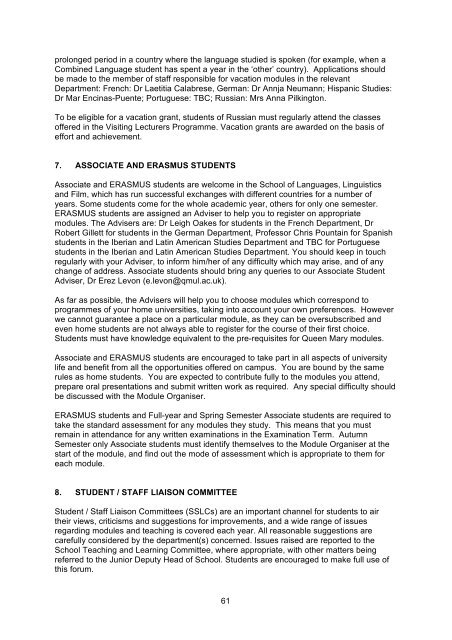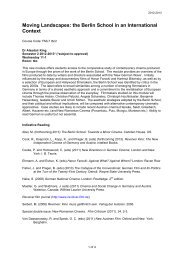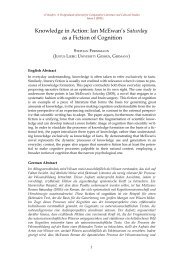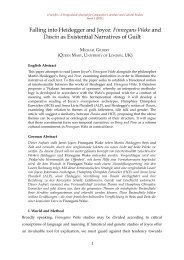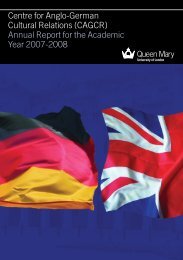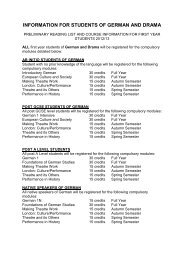Student Handbook - The School of Language, Linguistics and Film
Student Handbook - The School of Language, Linguistics and Film
Student Handbook - The School of Language, Linguistics and Film
You also want an ePaper? Increase the reach of your titles
YUMPU automatically turns print PDFs into web optimized ePapers that Google loves.
prolonged period in a country where the language studied is spoken (for example, when a<br />
Combined <strong>Language</strong> student has spent a year in the ‘other’ country). Applications should<br />
be made to the member <strong>of</strong> staff responsible for vacation modules in the relevant<br />
Department: French: Dr Laetitia Calabrese, German: Dr Annja Neumann; Hispanic Studies:<br />
Dr Mar Encinas-Puente; Portuguese: TBC; Russian: Mrs Anna Pilkington.<br />
To be eligible for a vacation grant, students <strong>of</strong> Russian must regularly attend the classes<br />
<strong>of</strong>fered in the Visiting Lecturers Programme. Vacation grants are awarded on the basis <strong>of</strong><br />
effort <strong>and</strong> achievement.<br />
7. ASSOCIATE AND ERASMUS STUDENTS<br />
Associate <strong>and</strong> ERASMUS students are welcome in the <strong>School</strong> <strong>of</strong> <strong>Language</strong>s, <strong>Linguistics</strong><br />
<strong>and</strong> <strong>Film</strong>, which has run successful exchanges with different countries for a number <strong>of</strong><br />
years. Some students come for the whole academic year, others for only one semester.<br />
ERASMUS students are assigned an Adviser to help you to register on appropriate<br />
modules. <strong>The</strong> Advisers are: Dr Leigh Oakes for students in the French Department, Dr<br />
Robert Gillett for students in the German Department, Pr<strong>of</strong>essor Chris Pountain for Spanish<br />
students in the Iberian <strong>and</strong> Latin American Studies Department <strong>and</strong> TBC for Portuguese<br />
students in the Iberian <strong>and</strong> Latin American Studies Department. You should keep in touch<br />
regularly with your Adviser, to inform him/her <strong>of</strong> any difficulty which may arise, <strong>and</strong> <strong>of</strong> any<br />
change <strong>of</strong> address. Associate students should bring any queries to our Associate <strong>Student</strong><br />
Adviser, Dr Erez Levon (e.levon@qmul.ac.uk).<br />
As far as possible, the Advisers will help you to choose modules which correspond to<br />
programmes <strong>of</strong> your home universities, taking into account your own preferences. However<br />
we cannot guarantee a place on a particular module, as they can be oversubscribed <strong>and</strong><br />
even home students are not always able to register for the course <strong>of</strong> their first choice.<br />
<strong>Student</strong>s must have knowledge equivalent to the pre-requisites for Queen Mary modules.<br />
Associate <strong>and</strong> ERASMUS students are encouraged to take part in all aspects <strong>of</strong> university<br />
life <strong>and</strong> benefit from all the opportunities <strong>of</strong>fered on campus. You are bound by the same<br />
rules as home students. You are expected to contribute fully to the modules you attend,<br />
prepare oral presentations <strong>and</strong> submit written work as required. Any special difficulty should<br />
be discussed with the Module Organiser.<br />
ERASMUS students <strong>and</strong> Full-year <strong>and</strong> Spring Semester Associate students are required to<br />
take the st<strong>and</strong>ard assessment for any modules they study. This means that you must<br />
remain in attendance for any written examinations in the Examination Term. Autumn<br />
Semester only Associate students must identify themselves to the Module Organiser at the<br />
start <strong>of</strong> the module, <strong>and</strong> find out the mode <strong>of</strong> assessment which is appropriate to them for<br />
each module.<br />
8. STUDENT / STAFF LIAISON COMMITTEE<br />
<strong>Student</strong> / Staff Liaison Committees (SSLCs) are an important channel for students to air<br />
their views, criticisms <strong>and</strong> suggestions for improvements, <strong>and</strong> a wide range <strong>of</strong> issues<br />
regarding modules <strong>and</strong> teaching is covered each year. All reasonable suggestions are<br />
carefully considered by the department(s) concerned. Issues raised are reported to the<br />
<strong>School</strong> Teaching <strong>and</strong> Learning Committee, where appropriate, with other matters being<br />
referred to the Junior Deputy Head <strong>of</strong> <strong>School</strong>. <strong>Student</strong>s are encouraged to make full use <strong>of</strong><br />
this forum.<br />
61


